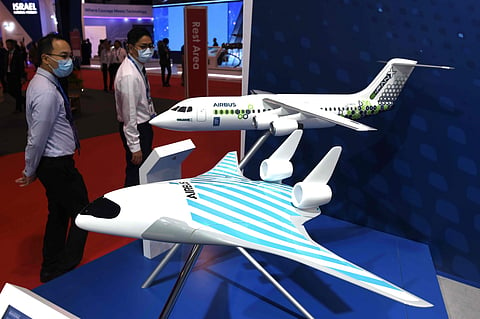
- LIFESTYLE
- FASHION
- FOOD
- ENTERTAINMENT
- EVENTS
- CULTURE
- VIDEOS
- WEB STORIES
- GALLERIES
- GADGETS
- CAR & BIKE
- SOCIETY
- TRAVEL
- NORTH EAST
- INDULGE CONNECT

SINGAPORE (AFP): Asia's biggest air show opened in Singapore Tuesday under the shadow of a deadly coronavirus outbreak that has forced dozens of companies to withdraw and is threatening to hammer the aviation industry.
The biennial Singapore Airshow attracts hundreds of global aerospace firms and airlines to the financial hub, where they negotiate multi-million-dollar deals and watch spectacular aerial displays by fighter jets.
But the virus - which has killed more than 1,000 in China and spread to more than two dozen other countries - is overshadowing this year's event.
Singapore has so far reported 45 cases, and the city-state last week raised its health alert level to the same as during the deadly 2002-2003 SARS outbreak.
The number of exhibitors deciding to skip the show has now climbed to over 70.
Withdrawals include US aerospace giant Lockheed Martin, which makes warplanes and defence equipment used by militaries around the world, Canada's Bombardier and plane maker De Havilland.
At least 10 Chinese companies have also pulled out after Singapore imposed a ban on people travelling from China in a bid to stem the spread of the virus, while a major aviation conference on the eve of the air show was axed.
Organisers decided to push ahead, however.
They are taking precautions such as limiting the number of public tickets and advising participants to greet one another by waving from a distance or bowing, instead of shaking hands.
Participants arriving for the first day of the show filed past a thermal scanner, which checked their temperatures and bottles of hand sanitiser were placed around the vast exhibition centre hosting the event.
The centre looked emptier than at previous editions of the show, however, and few major deals are expected this year.
'Challenging time'
There are some 930 exhibiting companies and more than 40,000 trade attendees from more than 45 countries, down from the last edition of the show in 2018 when over 54,000 trade participants and more than 1,000 companies took part.
Nevertheless, major players, such as Boeing - seeking to recover from a crisis sparked by fatal crashes involving its 737 MAX model - and Airbus, were still in attendance and organisers struck an upbeat note.
"Despite the current situation, attendance is encouraging," said Vincent Chong, chairman of organiser Experia Events, at an opening ceremony on Monday evening.
"While the travel restrictions have impacted the number of attendees at this year's Airshow, the current participant count tells us that (it) is still regarded as one of the world's leading aerospace and defence exhibitions."
Despite Chinese exhibitors pulling out, China's air force is still sending an aerobatics team to take part in the aerial displays that are a highlight of the show.
But the mood will likely remain subdued in Singapore this week as airlines reel from the impact of many nations barring Chinese travellers over the coronavirus outbreak.
The International Air Transport Association told reporters it was a "challenging time" and airlines would be "impacted negatively", but added it was too early to assess the full damage.
The association, however, noted that during the outbreak of Severe Acute Respiratory Syndrome (SARS) - which, like the current virus, spread from China and killed hundreds - Asia-Pacific airlines lost an estimated $6 billion in revenues.
The tourism industry as a whole will suffer "a massive negative blow" due to bans on arrivals from China, said Rajiv Biswas, Asia-Pacific chief economist at IHS Markit.
In the latest sign of the impact from the virus, Singapore's tourism board warned Tuesday that visitor arrivals to the city-state were expected to fall by about 25 to 30 per cent this year.
Coronavirus set to throw MWC Barcelona 2020 in Barcelona out of gear
Malaysian Hindus defy coronavirus outbreak to celebrate the annual Thaipusam festival
Global spread of the deadly coronavirus: Where is it right now?
China turns to AI, data in fight against coronavirus crisis
After coronavirus outbreak, Foxconn to make face masks as well as iPhones